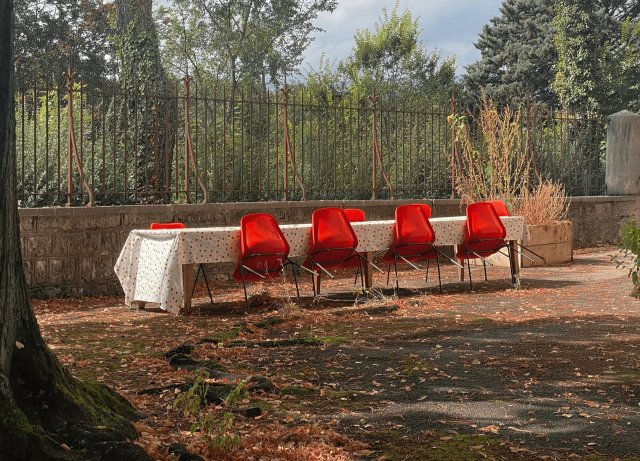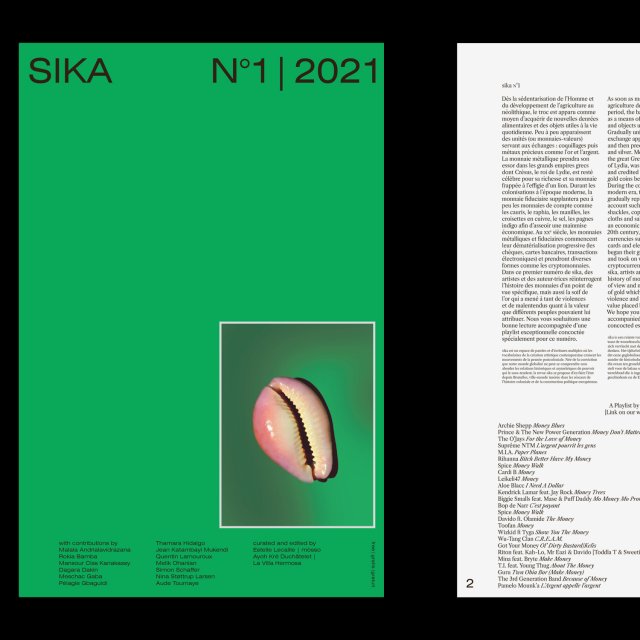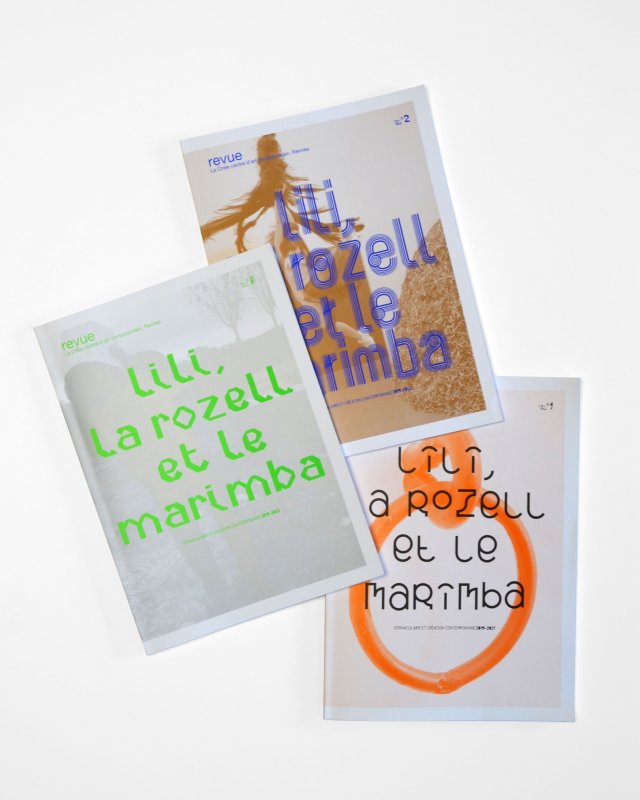Ways of Publishing #6 / December 3rd, 2021
Friday, December 3rd from 6pm to 8pm
Ways of Publishing #6
Interconnected Magazines : sika (Brussels) and Lili, la rozell et le marimba (Rennes)
A conversation between ayoh kré Duchâtelet and Estelle Lecaille (sika, Brussels), with Katia Kameli (artist) and Sophie Kaplan (director of La Criée, Rennes, Lili, la rozell et le marimba) and Baptiste Brun moderated by Lotte Arndt, followed by a reading by Vir Andrès Hera and a performance by Nadjim Bigou-Fathi and Soto Labor.
The form of the reviews is polyphonic : orchestrated by editorial committees, made with graphists and printing presses, developed in discussion with authors and artists, often defended against precarious financial conditions, the issues weave a thread, build a rhizomatic network, create momentary communities of thought around them to share the movement of multiple reflections. With their fragmentary, unfinished, deeply incomplete and imperfect forms, they exempt themselves from the constraints of a unifying and synthesizing way of thinking. Polyphonic in their essence, the reviews appear in constellations : an article is rarely limited to itself as it often refers to another ; an image evokes another. Nonetheless, this ongoing thought process regularly adopts a shape ; an issue that can be understood as an indication of a phase. A material object, complete in itself, even if it is part of an ongoing process – the next issue that is already pending.
While preparing the third issue of sika and the fourth of Lili, la rozell et le marimba, connected by numerous ongoing editorial conversations several members of the editorial committees of both the magazines get together for a launch and discussion evening. This is followed by a reading by Vir Andres Hera (author, member of Qalqalah قلقلة’s editorial committee and contributor to the next issue of Lili, la rozell et le marimba), and a performance by Nadjim Bigou-Fathi and Soto Labor. The evening is organized around languages, their multiplicity and intertwining, the way they are codified and classified, their subversive uses and exuberance.
Programme
6pm : The reviews sika and Lili, la rozell et le marimba.
Conversation between ayoh kré Duchâtelet and Estelle Lecaille (sika, Brussels), with Katia Kameli (artist) and Sophie Kaplan (director of La Criée, Rennes, Lili, la rozell et le marimba), moderated by Lotte Arndt.
7pm : Vir Andres Hera and Minia Biabiany, Cartilages archipels
Excerpts read by Vir Andres Hera
In a turbulent text that explains Vir Andres Hera’s and Minia Biabiany’s theoretical, political, and poetic inspirations, the authors express their desire to see Afrodescendant and Afrodiasporic figures support the construction of a contested Mexican national narrative. (Qalqalah قلقلة)
Performance by Nadjim Bigou-Fathi and Soto Labor
FRSH (search for an object in a pocket)
Groping, bodies, saliva and conversations from ♪ Là à là. La à là la à ici. D’ici, ici à là, si, si si, la ♪ are Frsh methods to question the way discourse is manufactured and the relationship of subordination between scores, performers, authors and audiences. It is an invitation to reshuffle the cards to facilitate the creation of narratives of histories and their dissonant but contiguous interpretations.

An event co-produced with La Criée, Centre d’art contemporain , Rennes
The reviews
sika is a space of multiple words and writings, where the vocabularies of contemporary artistic creation encounter the movements of post-colonial thinking. Born out of the conviction that our globalised world cannot understand itself without looking at the underlying historical and asymmetrical power relations, the review sika offers an opportunity to take stock of these relationships, looking at Brussels, a city-world, that is part of colonial history and the construction of European policy networks.
N° 1 and 2 : summer and autumn 2021, curated and edited by Estelle Lecaille for mòsso & ayoh kré Duchâtelet.

Lili, la rozell et le marimba
While the distance between located expression and a freely circulating hegemonic culture increases, numerous countercultures are resisting and emerging across the world today. With this they demonstrate the desire of the men and women who animate them to adapt to specific units, to be part of specific sites and to speak the languages from a specific territory. Forms of vernacular renewal appear like a vector for rootedness, making it possible to slow down and build new collaborations.
Questioning the relationships between productions, local knowledge and contemporary creation, the thematic cycle Lili, la rozell et le marimba—a contemporary and vernacular creation (2019-2022) at La Criée, contemporary art centre in Rennes, is accompanied by a review that aims to prolong and extend the questions raised by the artists invited to participate in the exhibitions and residencies that punctuate the cycle.
Each issue gathers contributions by artists, thinkers and researchers from different horizons, with a desire to support multiple voices and viewpoints, and primarily to provide a platform for artists’ voices to be heard.
The editorial committee consists of Lotte Arndt, Jean‑Roch Bouiller, Baptiste Brun, John Cornu, Katia Kameli, Sophie Kaplan and Émilie Renard. Whether they are artists, researchers or curators, the committee members share the same intentions in terms of paying attention to the other, and to other ways of being, while they also stand out for their sometimes different fields of research and viewpoints.
N°1 : September 2020, N°2 : January 2021, N°3 : June 2021, N°4 : April 2022

Biographies
Lotte Arndt
Researcher and curator, Lotte Arndt (Paris) supports the work of artists who question the postcolonial present and the contradictions of modernity from a transnational perspective. In the context of the international project Reconnecting Objects. Epistemic Plurality and Transformative Practices in and beyond Museums, she is currently working on an international research project on the contradictions of preservation in ethnographic museums. From 2014-2021, she taught at the École supérieure d’art et design in Valence Grenoble. She is a member of the art research groupOn-Trade-Off, cofounder of the online review Trouble dans les collections, and a member of the editorial committee for the review published by La Criée, art centre in Rennes.
Nadjim Bigou-Fathi (1990, FR) is a designer, visual artist and performer, living between Brussels and Narbonne. He graduated from the Ecole Européenne Supérieure d’Art in Brittany (Rennes), and from the Sandberg Institute (NL). His practice questions the arbitrary nature of the production of norms and truths, thus questioning the development of power relations and their legitimacy. Using curatorial, sculptural, or performative mechanisms, he stages wait and see situations involving Promethean figures.
He heads the research module Sparring (Académie des Beaux-Arts, Brussels, 2021) alongside the choreographer Mathilde Klug where, along with the students, they explore the rituals of encounters in their economy and their performativity. He has collaborated with the Belgian architectural office B612 (BE) and co-manages the artist-run space LOTO RUN in Brussels. He recently performed at KANAL POMPIDOU (Morphing, Group show, BE), and at ARV.I (Zorro, Solo, BG) and is currently working on the performance FRSH (collab. Soto Labor) recently shown at Eeeeh (Nyon, Switzerland).
Vir Andrés Hera(1990, Yauhquemehcan, Tlaxcala, Mexico) is a video artist and researcher. He graduated from Mo.Co. - Montpellier Contemporain (2015), the Fresnoy studio national des arts contemporains (2020) and the University of Quebec in Montreal (2020). He was an artist member of the Casa de Velázquez, Madrid (2015-2016). He teaches at the ESAAA - école supérieure d’art
Annecy-Alpes. In 2019, he joined Qalqalah-قلقلة’s editorial committee. His work was recently shown at : La Gaité Lyrique, Paris (2022) ; Art-by-Translation, Lisbonne-Cergy (2022) ; Dare-Dare, Montreal (2021) ; the MUCEM, Marseille (2021) ; the Institut Français, Rome (2021) ; the FRAC Occitanie, in Montpellier (2020) ; at La Kunsthalle, Mulhouse (2020).
Vir Andres’s practice is multidisciplinary. His imaginary, located in the interstices of sound and video experimentation, seeks to reflect on spaces surrounding film practice, orality and literature. In his work, all the realities of languages mingle : Aztec, Fon, Arabic, Creole, Otomi and other secret languages. Narrative is central to his works, often dotted with strange stories and anecdotes, literature and distant narratives, religious myths and oneiric figures, and sacred landscapes. Through his films, installations and texts, he dislocates the significant, atrophies similarities to generate interstices.
Katia Kameli is a Franco-Algerian artist and film director. She was born in 1973 in Auvergne, from the incongruous meeting, on a dance floor, of Moussa, an Algerian worker with an Afro hairstyle, and Danièle, a young nurse from the Berry region. Her practice is based on a research approach : the historical and cultural fact enriches the multiple forms of her visual and poetic imaginary She sees herself as a “translator”.
Translation is not a mere shift between two cultures, nor a simple act of transmission, but it also works as an extension of meaning and forms. The act of translation deconstructs the binary and sometimes hierarchical relationship between the idea of the original and the copy. Within her work we find rewritten texts. She highlights a global history, made up of porous boundaries and reciprocal influences, in order to open up a reflexive and generative path to a critical view of the world.
Sophie Kaplan has been director of La Criée contemporary art centre since 2012. She holds a degree in modern literature and art history and is an art historian and exhibition curator. She worked at the École nationale supérieure des beaux-arts in Paris from 1999 to 2007 and, in parallel, curated exhibitions in Germany and England. Director of the Rhineland centre for contemporary art in Altkirch from 2007 to 2012, she also taught at the Haute école des arts du Rhin (Strasburg). She has curated numerous exhibitions and regularly publishes catalogues and artists books. Her critical approach and her curatorial practice develop around the importance attributed to collaboration—particularly with artists ; the room left for narratives as motors of research, creation and transmission, the interest in the intersections of the arts, disciplines and knowledge.
ayoh kré Duchâtelet
ayoh kré Duchâtelet’s approach involves a documentary investigation into situations of colonial and contemporary history. The research leads to heterogeneous fictional productions ; texts, images, video installations… His practice also develops by paying attention to meetings and collaborations. In 2021, in dialogue with Sammy Baloji, he began a project that deals with the relationship between the different forms of Belgian Art Nouveau, or the “Style Congo” and the imperial expansion at the beginning of the 20th century. He occasionally collaborates with Sophie Sénécaut in the context of the “CRAWL” project (residency at the Laboratoires d’Aubervilliers in 2021). Since 2018, He has been exploring different modalities to hybridise art research methods with Déborah Levy, Lionel Maes and Antoine Wang. In 2021, they presented the exhibition "What Does It Have To Do With Everything Else" at iMAL, Brussels. he is also cofounder of the review (four issues) “sika” with the association mossò, and he teaches at the graphic research school (Erg), where from 2018 to 2021 he coordinated the multidisciplinary workshop programme Design et politique du multiple. Since 2009, at the graphic and digital design workshop at Villa Hermosa, he has been working with and for collectives, institutions, sites and associations where he chooses to share the responsibility for their actions for a certain period, whether these activities are social, cultural, artistic or activist.
Soto Labor (1993, FR) is a visual artist, poet, and performer. He focuses on the conditions under which discourse is exercised and the way it is enunciated. He engages with this field by manufacturing scenarios that he most often embodies in collaboration with other artists. The accessories and elements used in his performances are very often pre-made or cobbled together. A low-fi and low-tech sculptor, he creates forms that coincide with his immediate environment in a low budget economy based on dirty objects and collage.
He supports the choreographer and researcher Pauline L. Boulba in her play Ôno-sensation (CND Pantin, 2019) and is accompanying her in her ongoing creation with Aminata Labor, J.J. (2021). Invited by Théo Robine-Langlois, he publishes Trompette a publication that appeared in the Présage Pamphlet series, After8books. He is currently working on the FRSH performance (collab. Nadjim Bigou-Fathi) recently shown at Eeeeh (Nyon, Switzerland).
Estelle Lecaille is an art historian and curator at mòsso in Brussels, an independent collaborative platform for contemporary artistic practice that designs and supports international projects in Europe with countries of the South. Since 2013, within this structure she developed the artistic exchange project between Belgium and Benin dokountin, which means there where wealth is found in Fon. In 2015, she organized the exhibition Incarnation(s) at the Maison des Cultures in Molenbeek Saint Jean, which gathered artists from various horizons around the question of the invisible. The same year, she was responsible for the editorial coordination of books by the photographers Teddy Mazina and Kiripi Katembo, published by Africalia. She collaborates with the magazines IAM, Diptyk, l’art même and the online platform Afrique In Visu. Since 2016, she has been working with the Congolese artist Sammy Baloji, particularly for the Lyon Biennial, the Dakar Biennial, and the Kassel and Athens editions of Documenta.
Baptiste Brun is a contemporary art history teacher-researcher. He co-supervises the master’s Métiers et arts de l’exposition Exhibition professions and arts) at the University of Rennes 2, a curatorial course that has organised numerous solo exhibitions at the Art & Essai Gallery (Sammy Baloji, Harun Farocki, Ben Kinmont, Zineb Sedira). His works deal with the interactions between artistic creation, art history, anthropology and psychiatry in the second half of the 20th century and the epistemology of art history viewed in comparison to primitivism. He has contributed to various publications like the issue of the Almanach de l’Art Brut (5 Continents, 2016) and is the author of Jean Dubuffet et la besogne de l’Art Brut : critique du primitivisme (Presses du réel, 2019). As an exhibition curator, he was notably responsible for the exhibition Jean Dubuffet, un barbare en Europe (Mucem, Marseille ; Ivam, Valencia ; MEG, Genève, 2019-2021). He is currently researching the way ethnographers responded to objects from Alpine cultures in the last century. In parallel to these activities, he heads a study of conference-performance that deals with a critique of the authority of discourse in the SHS (Les schizomètres de Marco Decorpeliada, with Marcel Bénabou, Dominique Deliège, Jean-Luc Deschamps, Yan Pélissier and Olivier Vidal ; Les Conférences du Docteur Bâton).
mòsso is a not-for-profit association, founded in 2014 by Estelle Lecaille, Lucrezia Cippitelli and Rosa Spaliviero in Brussels. The association’s aim is to do research and contribute a reflection on contemporary creation emanating from countries in Africa, the Caribbean, the Pacific and Latin America. They also seek to develop lasting international artistic collaborations between Europe and countries in Africa, the Caribbean, the Pacific and Latin America, help emerging artists living in Belgium gain visibility, more specifically Congolese artists and the Congolese diaspora, to promote current cultural innovation and realise artistic projects on current environmental and societal challenges. mòsso organises exhibitions, film screenings, intersecting artists’ residencies, publishes texts and produces artist videos and films.
Event co-produced with La Criée centre for contemporary art, Rennes.

Share